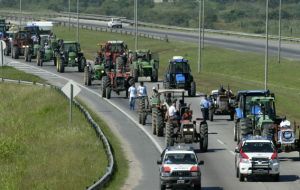MercoPress. South Atlantic News Agency
Protesting Argentine farmers prepare for another clash in Congress

Argentine farmers are back on active protest after the latest frustrating meetings with government officials for the moderation or elimination of export taxes on grains and oilseeds and requests of aid for drought stricken areas.
Grass root groups are again camping on road sides, while leaders organize rallies in highly sensitive agriculture areas and promise to be in Congress next week in support of opposition legislation eliminating export taxes, which are at the heart of the year long dispute, precisely this month of March.
In an open rally in Cordoba farm leaders, next to members of the opposition announced their list of demands and attacked President Cristina Fernandez de Kirchner who again in her latest speeches referred to the “greedy” and “insatiable” powerful who “couldn’t care less about the rest of Argentina”.
“Next week Mr. Legislators we will be in Congress next to you in support of the laws the country needs”, said Mario Llambías head of the Argentine Rural Confederations one of the four organizations of the farmers liaison table.
“Farmers are not the insatiable rich which Mrs. Kirchner describes in her speeches”, said Argentine Rural Society president Hugo Biolcati. “Maybe if the lady travelled less in helicopter and more by land she could see the cracked soil and dust bowls, with starving cattle”, he added.
Eduardo Buzzi from the Argentine Agrarian Federation said the government is intent in not modifying export taxes because it needs the money “for its discretional spending among friends and cronies”.
“We are in the ridiculous situation where international prices of commodities have plummeted but in Argentina they remain virtually unchanged for consumers because of the export taxes. A situation that will worsen in the coming crops because farmers won’t invest money or time in planting”, said Buzzi.
“We would all like to know whose dinning table this government is protecting, certainly not that of the average hard working Argentine”.
The farmers’ agenda of requests includes elimination of export duties; a new incentives policy to help balance production among livestock, dairy, oilseeds and grains; elimination of the office which establishes export quotas; a fair taxing policy and access to credit and benefits for improved production and yields.
Meanwhile opposition legislators have promised to present next week in the Lower House a bill eliminating export duties on grains and oilseeds.
Last July in the midst of the dispute with farmers, the administration of President Cristina Kirchner believing it had sufficient votes in Congress presented for ratification (resolution 125) which imposed a sliding windfall duties system for oilseed and grains exports.
Unexpectedly for the Kirchner couple, but not surprisingly for political analysts, the Senate with the decisive vote of the vice president Julio Cobos rejected the resolution. Mr. Cobos instantly became a national hero and number one enemy of the Kirchners.
It was the greatest political defeat of the until then unbeatable Kirchners presidencies, showing them vulnerable, and since then the erosion of power has continued.
When the new bill reaches Congress it can’t be anticipated what could happen since the Kirchners will fight back and have the resources, but the power haemorrhage will continue and another issue could crop on the table: governance and the soundness of the Argentine institutional framework.
This is evident as legislators from the ruling catch all Peronist coalition (currently under Kirchner control) flee to what seems a budding strong new option, which most probably will be confirmed in next October’s mid term elections when half the Lower House and a third of Senate seats have to be renewed.
Until then what is certain is that under current circumstances farmers will not be willing to produce at full potential and Argentina could again fall into that perilous cycle of extremes (strong to weak; weak to strong governments) with no solid middle ground relief for normal Argentines.




Top Comments
Disclaimer & comment rulesCommenting for this story is now closed.
If you have a Facebook account, become a fan and comment on our Facebook Page!